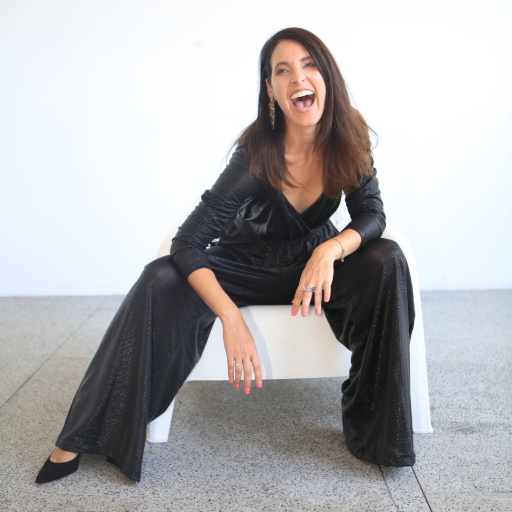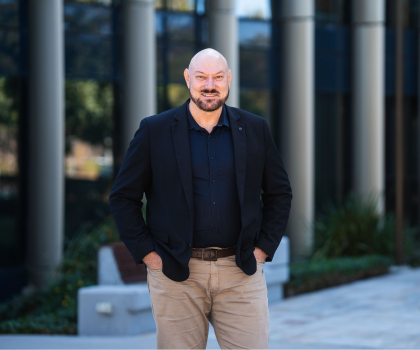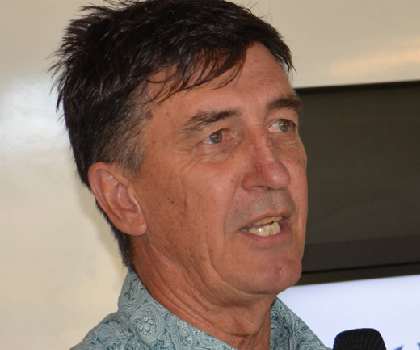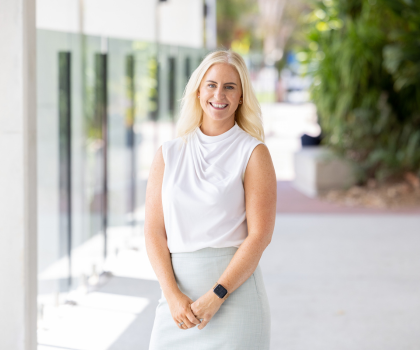
Pictured: Sarah Neill Founder & CEO Mys Tyler
Sarah Neill graduated with her Master of Business Administration, International Business (MBA) in December 2010. We, the MBA Team sat down with Sarah to talk about her business, MBA journey and everything in between.
Tell us about Mys Tyler, what is you mission and how did this come about?
We all have to get dressed every day, and when we like what we’re wearing, we feel better about ourselves. This was supported by research we conducted last year that revealed that while only 1 in 4 women are body confident, 89% are more body confident when they like their outfit.
We don’t see fashion as being superficial, we see its ties to mental health, confidence and the impacts those have on us day to day.
Fashion has historically been inaccessibly aspirational. Models don’t represent most women, and as a result the industry is suffering from a huge inefficiency related to product fit that leads to high returns (and environmental waste). It’s costly for brands, and it’s a painful process for consumers.
Trying on the clothes is required to see what fits, how it falls and how it works with styling and different pieces. It’s not efficient for every woman to try on all pieces, and not possible with the shift to ecommerce.
That’s why we created Mys Tyler, as a way to match with women with your body, who love fashion, love discovery and styling and can do the job of finding outfits that will fit your body.
Not only do we help women find and buy clothes that fit, but by seeing themselves represented in fashion, we are helping women feel more confident (86% of users are more confident as a result of using Mys Tyler), and showing them that they do fit in the world of fashion!
What's the biggest challenge you've had to overcome in your career or life journey?
Not all businesses need venture capital to get started. Many can be bootstrapped, and can grow sustainably. The concept of Mys Tyler is hugely ambitious, it required building a platform, a marketplace and a community with high retention and engagement. We needed substantial capital to get this off the ground. But to attract venture capital, you need to show that you could be a billion dollar business. If one day you could be worth $50 million, that’s not interesting to them. VC’s take a big risk, so they want a big reward. Fundraising is really tough, it’s a lot of preparation - pitch decks, data room, financial models, networking, a lot of pitching, a lot of rejection and a lot of energy. They advise that one founder should be fundraising, while another founder should be left to run the company. As a sole founder, I’ve had to do both, and switching between operational problem solving, to big picture opportunity pitching is really draining. It’s also a hard market to be raising for a consumer business in Australia where the priority is B2B and enterprise. The US has a much bigger, more sophisticated venture market, with firms dedicated to consumer. So I’ve spent a lot of time living on friends air mattresses and lugging bags on public transport to hustle and meet with investors without breaking the bank. Finally, there’s a big gender gap in fundraising for female founders - something I’m extremely passionate about after experiencing first had, and through all the experiences of fellow founders. Currently, in Australia women are getting just 0.7% of the capital. It’s an implicit bias, which sadly gets worse when the market contracts, investors become more conservative and lean towards what they feel comfortable with. There are tips to navigating this bias, but the sad truth is, it’s just a lot harder for female founders.
As the Founder & CEO for Mys Tyler, what does this involve? What does your day to day look like?
We’re an incredibly small team. Dan, our CTO runs our engineering team - so he manages the architecture, back end and front end coding. It’s great to have that taken care of, but then I work across pretty much everything else. I am very involved in the product design, functionality and prioritisation, I look after the marketing and PR (with the help of our PR guru Megan), I manage stakeholders and am responsible for raising capital, I look after the P&L and run the budget, and I work closely with our community team to keep the fashion contributors on our site, happy and engaged. As a founder, you pretty much fill any gap, whether it’s something you know how to do or not, so frequently I’m doing things that I’m not great at.
In your opinion, how can Women entrepreneurs set themselves up for success?
Watch the TED talk by Dana Kanze, who describes the gender bias, and gives tips to help navigate. Learn how to sell the dream, so you can make it a reality. Investors know that this is risky, so you’re showing them what’s possible - you don’t need to factor in all the things that could go wrong - they’ll do that for you. You need to get them excited or you won’t have the chance to make it happen. And finally, build relationships, let investors get to know you over time, show them that you do what you say you’re going to do, and prove your reliability.
Mys Tyler recently launched Brandsforyourbody.com, what inspired this new site?
One of the insights we’d learned through Mys Tyler is that women have go-to brands they have tried and tested, and that they know fit their body. Women want to try other brands but unless you can go into a shop to try them on it’s really risky and often not worth it when shopping online. But if you find a creator on MYs Tyler with a similar body who wears brands that you do in your size, then other brands they were suddenly become a viable option, they’ve tried and tested them for you, so you have a higher confidence.
The Mys Tyler app requires you to create an account and provide more data points, so that we can match you to creators around the world. These creators are willing to share their body data, and their outfits knowing it’s a safe protected space.
Brands for your Body allows us to give up a light version of the data, to make it available to more people without the barriers of an app download or account sign up.
It also acts as a teaser for Mys Tyler, helping to grow our brand awareness and get more people onto the app - or just shopping (for clothes they don’t need to return).
From an acquisition point of view, getting someone to a website is cheaper than getting someone to download an app, so it’s a new channel for us as well.
You and your team seek to empower women and build body confidence. Is there a success story you would like to share?
I spoke to a woman in Indonesia the other day. She said that before Mys Tyler fashion was a secret passion. She would get dressed up in her bedroom, but not wear her favourite outfits outside. She’s plus size and in her community, she felt that she wasn’t able to wear that type of fashion, and the fashion communities can be quite nasty if you don’t fit their mould. She joined Mys Tyler and began to receive such positive support from our community, that she went on to create an Instagram account, and then to start wearing her clothes out the door. She said that it’s truly changed her life. Another women emailed us saying that as someone turning 60, it’s been beautiful seeing women not just of different shapes, sizes and ethnicities, but also of different ages. This age sentiment has been repeated many times - women can often feel they become invisible as they age, and there’s a severe lack of fashion references available to them.
Which female(s) have inspired you throughout your career and why?
I’ve been lucky to have a lot of incredibly strong, smart, articulate women cross my paths in my career who demonstrated what was possible. When I was doing my undergraduate degree I worked for a homewares store, it was brand new and started by Melinda Conrad, who was an American who’d completed her MBA at Harvard, married an Australian and was bringing a US concept to Australia. She was incredibly savvy, she’d been at school with Jeff Bezos and Amazon had just launched. She took me under her wing, and allowed me to test out ideas and build skills with her - I’d run focus groups, created a newsletter, and after taking some time off (to do an exchange semester in Canada) during which time she’d opened some new stores I went in and did mystery shopping. There was another woman Tracey who was at Optus, when I was at Boost, and she was a force! And finally Sherrie the COO when I was at Ultra Mobile in the US.
What surprised you most about your MBA journey?
I was surprised how much I loved studying my MBA. If I’m honest, I struggled and passed my way through my undergrad. I wasn’t sure what I wanted to do with my career, and I felt more responsibility for my minimum wage retail job than I did for my studies. I began my MBA thinking that if it was too much I could complete a portion and end up with a postgraduate certificate instead. But I loved the entire thing. Unlike my undergraduate, which I felt I had to do, the MBA was for me. After 8 years working in business, I had a lot more context, I was learning about things I’d been doing already, now giving these things a name and a construct. I could apply my learning's immediately into my day to day role and so seeing the value was immediate.
If you have a question for MBA Alumnus, Sarah Neill, we encourage you to connect on LinkedIn.
You may also like

Meet Academic, Associate Professor Peter Woods
Peter is the Course Convenor for Doing Business across Asia-Pacific, a core course in the accelerated online MBA program. He has a wealth of cross-cultural management knowledge and experience, which we explore in this interview.

Meet MBA Alumnus, Vince Sherry
Vince Sherry graduated with his Master of Business Administration ( MBA ) in 2020. We, the MBA Team sat down with Vince to talk about his business VS Strategies, the recent launch of his latest social enterprise project - Angry Bull Trails, his biggest challenge as an entrepreneur, MBA Journey, and everything in between.

Meet MBA Student, Briony Low
Briony is a Human Resources professional who has worked with several organisations in the retail, government and hospitality sectors. In this interview, Briony talks about the evolution of Human Resources and shares advice for future MBA students.